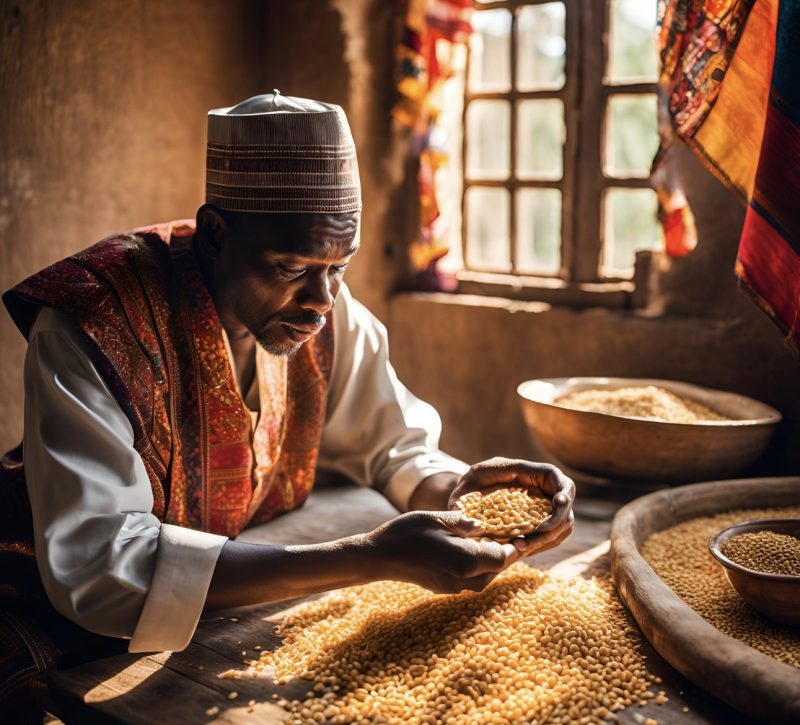Why I counted grains was a ‘question’ I had no immediate answer to. But something pushed to the limit and I just couldn’t hold it anymore. The details will crack you!
I locked myself inside the house for an entire week. It wasn’t a vacation. No, it was a mission. A mission of monumental importance. There, in the quiet of my home, surrounded by piles of paper and an unforgiving 50kg sack of rice. I sought an answer to the question that has been tormenting my mind for weeks. Next month is Christmas, why and how did a bag of rice get to N130,000?
I decided to count the grains of rice. All of them. Every single one. No distractions, no excuses. I was going to break this down mathematically, scientifically, and—dare I say—philosophically. Trust me, I would have the answers.
I needed to find out the quantity, then divide it by cost. I also intended to find out they added gold to the grains. But first, I needed to get everyone out of the way. Including my wife.
Wife: “Oga, what exactly are you doing in there?” My wife’s voice cut through the door. It was the third time that morning she had asked, but I wasn’t ready to come out.
Me: “I’m busy counting rice grains,” I answered, as if that was the most normal thing in the world.
Wife: “Counting rice grains?” she repeated incredulously. “Is that what you’re doing with your life now? Counting grains of rice? What are you, a scientist or a madman?”
Me: “I’m solving a problem, woman!” I barked. “I need to understand why a bag of rice has quadrupled.” I tried to concentrate as I peered at the sack on the floor. It was bulging, its weight mocking me. The grains shifted in the sack as if to say: “Sir, you really want to count us? Can you count the nation’s problems?
Nobody understood why I counted grains
Just then, it hit me. Last time I checked, we couldn’t even count the number of days we didn’t have electricity. Or how many times the price of fuel jumped in the last few month.
I was too deep in thought, imagining myself as a noble hero on a quest for truth. Meanwhile, my wife’s footsteps grew louder as she approached the door.
Wife: “Oga,” she called again. “How long are you going to stay in there? It’s been three days. The kids need help with homework,”
I sighed. “You don’t understand. I have to finish this. If I can figure out why rice costs more than my old car, maybe, just maybe, I’ll be able to understand why everything else is so expensive.”
The first few grains were easy enough. One. Two. Three. I started to feel a sense of purpose. This was it. I was going to unlock the mystery of Nigeria’s spiraling economy with my own two hands. But then, I realized: I had no plan. Just staring at the grains felt like I was getting nowhere fast. How many grains were in a 50kg bag? 10,000? 50,000? I couldn’t tell.
Anyway, I decided to take a scientific approach. I started scooping out handfuls and counting them, then multiplying to estimate how many grains could fit in the whole bag. After an hour of this madness, I thought: This is impossible. It’s not just the rice. It’s the whole country.
Rice not the issue
Rice was no longer just rice. It become a metaphor for everything I couldn’t control. Every grain I counted was a small tragedy: the inflation rate climbing every day, fuel prices rising like the tide, the incessant blackouts that never seem to end.
Then, I realized something even more unsettling. At the rate rice prices are increasing, before Bola Tinubu’s tenure, a bag would probably cost more than my life. Yeah, it might cost more than the entire year’s salary of an average Nigerian worker.
I stopped, looking at the growing mountain of rice in front of me. I hadn’t moved in hours. Rice, grains, numbers… everything blurred into a nonsensical, overwhelming haze. I can’t keep counting rice for the rest of your life.
Maybe, there was no point to it. I couldn’t even count the damn rice without losing my mind. How was I supposed to count the cost of living when the numbers make no sense anymore?” It was now clearer that the problem wasn’t the rice. It’s the system. And no matter how many grains I counted, nothing would change.
Price was why I counted grains
The price of rice didn’t exist in a vacuum. It was a symptom of a greater disease: the broken economy, the skyrocketing cost of living, the endless fuel price hikes, the daily reality of inflation that no one could control. And as I stared at the bag of rice—now hopelessly half-emptied—I realized I wasn’t counting grains anymore. I was counting the days since I’d last had a peaceful, stable life.
In the end, the number I reached was just as meaningless as the price tag attached to the rice. Numbers and prices had become abstract concepts, disconnected from the lives of ordinary Nigerians.
“How many grains are in this bag?” I asked aloud to no one in particular. No one knew. No one could count. But it wasn’t the rice or the fuel prices or the endless strikes. It was the feeling that everything was slipping through our fingers, grain by grain. Sadly, we have no control over anything, anymore.
The hardship in Nigeria isn’t just a matter of rice. It’s a matter of what we can’t count anymore—the uncertainty, the rising prices, the strikes, the blackouts, the endless pain of living under a system that doesn’t add up!

Leave feedback about this